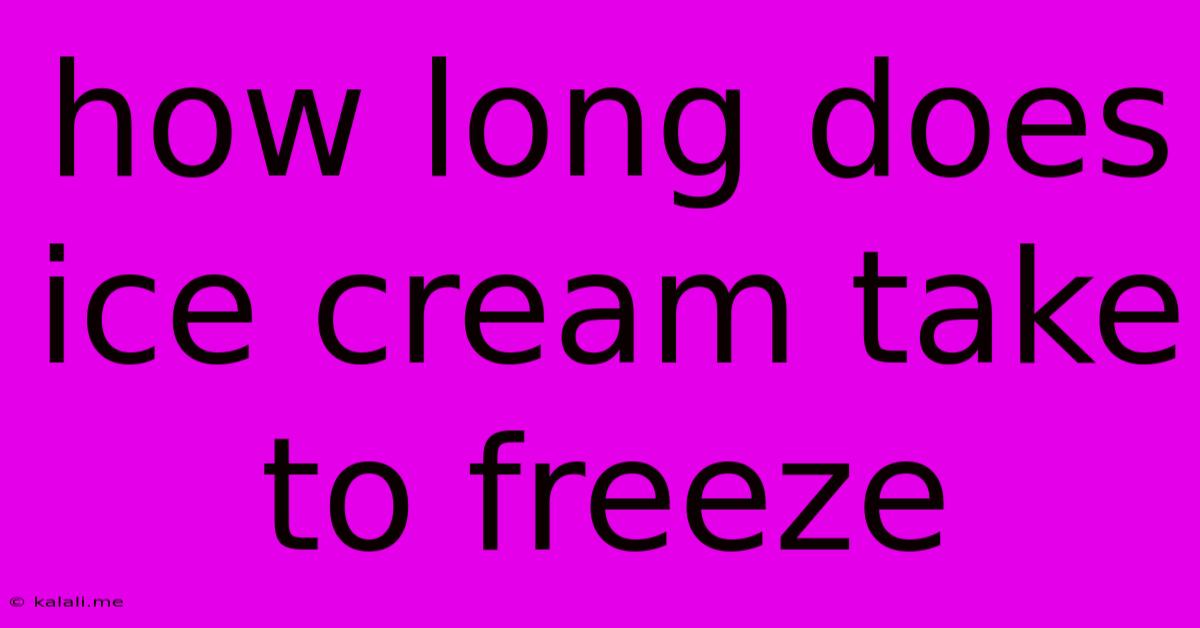How Long Does Ice Cream Take To Freeze
Kalali
May 20, 2025 · 3 min read

Table of Contents
How Long Does Ice Cream Take to Freeze? A Guide to Achieving Perfectly Frozen Treats
So, you've whipped up a batch of delicious homemade ice cream, and now the big question: how long does it take to freeze? The answer isn't as simple as a single number, as several factors influence freezing time. This comprehensive guide will break down everything you need to know to achieve perfectly frozen, creamy ice cream every time.
Understanding the Freezing Process: Ice cream freezing isn't a simple process of dropping it into the freezer and waiting. It's a gradual transition involving the formation of ice crystals, which affect the final texture. Faster freezing leads to smaller ice crystals, resulting in a smoother, creamier consistency. Slower freezing results in larger ice crystals, leading to a coarser, icier texture.
Factors Affecting Ice Cream Freezing Time:
Several variables influence how long your ice cream needs to spend in the freezer:
-
Type of Freezer: A high-quality freezer with consistent temperature control will freeze ice cream faster than an older, less efficient model. Chest freezers often freeze more quickly and evenly than upright freezers due to better air circulation.
-
Ice Cream Base: The composition of your ice cream mixture plays a significant role. Higher fat content typically freezes more slowly because fat molecules hinder ice crystal formation. This is why ice cream recipes often include heavy cream or whole milk. Adding alcohol (like in boozy ice cream) can also slightly slow down the freezing process.
-
Amount of Ice Cream: A smaller batch will freeze considerably faster than a larger one. A larger volume requires longer for the cold to penetrate the entire container.
-
Container: The material and shape of your container can affect freezing time. Thinner containers will freeze faster than thicker ones. Shallow containers allow for quicker freezing compared to deep containers. Using metal containers can help with faster freezing.
-
Freezer Temperature: Maintaining a consistently low freezer temperature is crucial. A colder freezer will naturally freeze ice cream faster.
Typical Freezing Times:
While there's no magic number, here's a general guideline:
- Small batch (less than 1 quart) in a shallow container in a high-quality freezer: 4-6 hours.
- Standard batch (1-2 quarts) in a standard container in a high-quality freezer: 6-8 hours.
- Large batch (more than 2 quarts) in a deep container in a less efficient freezer: 8-12 hours or even longer.
Tips for Faster and More Even Freezing:
- Pre-chill your ice cream base: Chill your ice cream mixture thoroughly in the refrigerator for at least 2 hours before placing it in the freezer. This gives it a head start on the freezing process.
- Use a shallow container: This allows for better and faster heat transfer.
- Stir during the freezing process: While this isn't always necessary, stirring your ice cream every hour during the initial freezing process can help to break up ice crystals and achieve a smoother texture. This is especially helpful for no-churn ice cream recipes.
- Check for doneness: Don't rely solely on time. The best way to determine if your ice cream is fully frozen is to check its consistency. It should be firm enough to scoop but not rock-hard.
Conclusion:
Freezing ice cream is a process influenced by several factors. By understanding these factors and following the tips provided, you can achieve perfectly frozen homemade ice cream every single time, allowing you to enjoy your delicious creations. Remember to always check for firmness rather than strictly relying on the time estimates. Happy freezing!
Latest Posts
Latest Posts
-
Reasons Not To Join A Union Uk
May 20, 2025
-
Difference Between A Spade And A Shovel
May 20, 2025
-
How To Remove Plaster From Brick Wall
May 20, 2025
-
Wiring A Three Way Light Switch Uk
May 20, 2025
-
Other Ways To Say I Have
May 20, 2025
Related Post
Thank you for visiting our website which covers about How Long Does Ice Cream Take To Freeze . We hope the information provided has been useful to you. Feel free to contact us if you have any questions or need further assistance. See you next time and don't miss to bookmark.